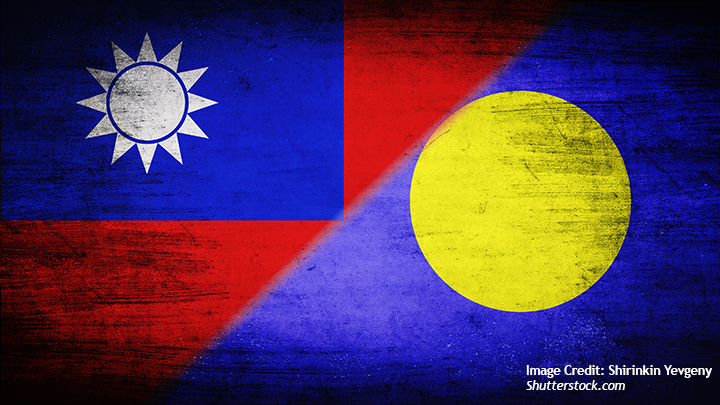Taiwan and Palau – Recognition’s Many Facets

Larissa Stünkel
Introduction:
The tiny Pacific nation of Palau caught headlines when it co-hosted the seventh “Our Ocean Conference” in mid-April this year. For Palau’s president, Surangel Whipps Jr, the hybrid gathering certainly was a moment of pride. In many ways, the discussions held finally focused on the Pacific Islands’ real concerns – the foreseeable impact of climate change and rising sea levels, among others, on islanders’ lives. With all eyes notably set on Palau’s National Gym to follow lively debates, the simultaneous presence of a Taiwan Coast Guard vessel went largely unnoticed. After all, bilateral relations between Taiwan and Palau have been perennial even in the face of geopolitical shifts – including the Sino-Solomon Islands security pact and a heated Australian election campaign. And, as Whipps has made repeatedly clear, “nobody dictates our [Palau’s] friends” – ultimately begging the question of what underlying factors are at play in Palau’s recognition of Taiwan’s statehood.
You can read the full article on De Facto States Research Unit’s website.
Related Publications
-
Navigating the Indo-Pacific: How Australia and the EU Can Partner for Peace, Stability, and Prosperity
To navigate the choppy waters of the Indo-Pacific, the EU and Australia must be on the same wavelength regarding shared interests in rules, values, and an open and liberal economic […]
-
Indo-Pacific as a Strategic Imperative for the EU: Whither Australia?
No global actor can afford to fall short in contributing to a stable, peaceful, and prosperous Indo-Pacific—this particularly applies to a somewhat distracted European Union (EU). The EU should become […]
-
Japan: No Indo-Pacific Order Without International Order
In April, Japanese Prime Minister Kishida Fumio, in his address to the joint meeting of the U.S. Congress, made the case for a stronger “global partnership” with the United States as part […]
-
Connecting Taiwan and Finland: An Interview with Prof. Julie Yu-Wen Chen
Julie Yu-wen Chen is Professor of Chinese Studies at the University of Helsinki in Finland. Since 2023, she has been involved in the EU twinning project “The EU in the […]
-
Taiwan and the Diplomatic Squeeze
In mid-March 2023, the self-governing island of Taiwan lost another one of its already few diplomatic allies. Announcing the severing of diplomatic ties between Taiwan and Honduras on Twitter on March 15, […]




